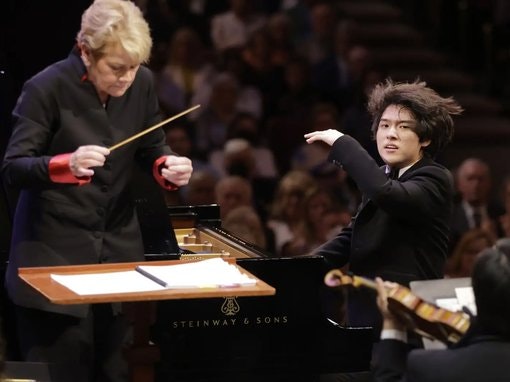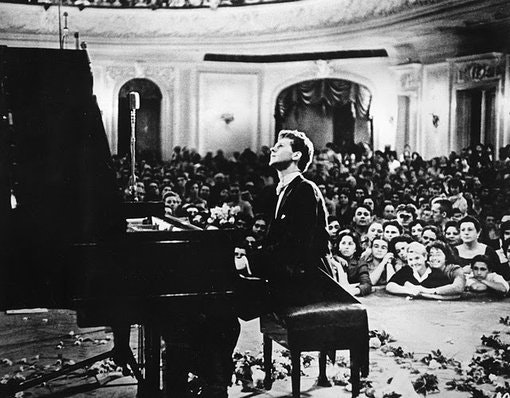The Cliburn Then and Now
The Seventeenth Van Cliburn International Competition (2022)

The Van Cliburn International Piano Competition is widely considered “one of the most prestigious contests in classical music” (The New York Times). From its origins in 1962 through today, it has remained dedicated to sharing music with the largest international audience possible and to launching the careers of its winners. The 2025 edition builds on that rich foundation and the historic success of the 2022 edition, which has become one of the most-watched classical events in history—60 million views across 177 countries—and propelled Gold Medalist Yunchan Lim's meteoric rise to stardom. In the just three seasons since his Cliburn win, concert engagements have included most of the world’s career-highlight venues and orchestras, including the New York Philharmonic, Los Angeles Philharmonic, Tokyo Philharmonic Orchestras, and Orchestre de Paris, and Carnegie Hall, Kennedy Center, Wigmore Hall, Concertgebouw, and Seoul Arts Center (most quickly sold out). His performance videos are now the most viewed online for some of classical piano’s most popular works, including Rachmaninov's Piano Concerto No. 3, Beethoven's Piano Concerto No. 3, Liszt's 12 Transcendental Etudes, and Mozart's Piano Concerto No. 22, K. 482.
From an applicant pool of 340 pianists representing 45 countries and regions, 30 have been invited to compete from May 21 - June 7, 2025. In front of warm Fort Worth audiences, fans around the world watching online, and an outstanding jury chaired by Paul Lewis, they'll perform across four rounds; for finalists, that will mean more than 4 hours of music each.
Beyond the cash awards, they're competing for a chance at an international touring career: medalists win three years of comprehensive and personalized career management, which includes concert bookings, artistic support, and bolstered publicity efforts. The total Cliburn prize package is worth an estimated $2 million.

History of the Cliburn
Winning the first Tchaikovsky Competition in Moscow at the height of the Cold War in 1958 brought Van Cliburn unprecedented celebrity for an American concert pianist. Cliburn’s international victory instilled a fresh sense of artistic pride in many Americans, while opening the door to a new era of cultural relations between East and West. The Van Cliburn International Piano Competition was established shortly thereafter to perpetuate Van Cliburn’s unique legacy of demonstrating how classical music, in the hands of a master, has the appeal to reach across all borders.
At a dinner banquet in November 1958, Dr. Irl Allison, founder of the National Guild of Piano Teachers, passed a note to Grace Ward Lankford, co-founder of the Fort Worth Piano Teachers Forum. The note read, “Hold onto your seat, I have a startling announcement!” Standing before a crowd of 500, including Van Cliburn and his mother, Rildia Bee O’Bryan Cliburn, Dr. Allison announced his intention to offer a $10,000 first prize to be awarded by an international piano competition named in Cliburn’s honor. The idea caught everyone (especially Van Cliburn) by surprise, and immediately ignited the imagination and enthusiasm of music lovers and civic leaders throughout Fort Worth.
A small corps of volunteers began to raise funds, type labels, and lick envelopes as Ms. Lankford enlisted the support of an astonishing range of politicians, internationally-renowned composers, conductors, musicians, business leaders, and professional educators, in pursuit of what must have seemed an impossible goal: to create a world-class international piano competition in a city still affectionately known as “Cowtown.” By 1961, the pieces were falling into place, and the Van Cliburn Foundation was officially chartered.
First held in 1962, the quadrennial Van Cliburn International Piano Competition quickly established itself as an event that inspires and engages the local community, while gracing the international stage. The Cliburn Competition is one of the few musical events in the world to arrange for competitors to stay with host families, often resulting in close, long-term relationships: this has resulted in southern hospitality becoming a singular trademark of the Cliburn Competition.
Take the competition to another level with insights, alerts, and updates right in your inbox.
Sign up for the #Cliburn2025 newsletter!

